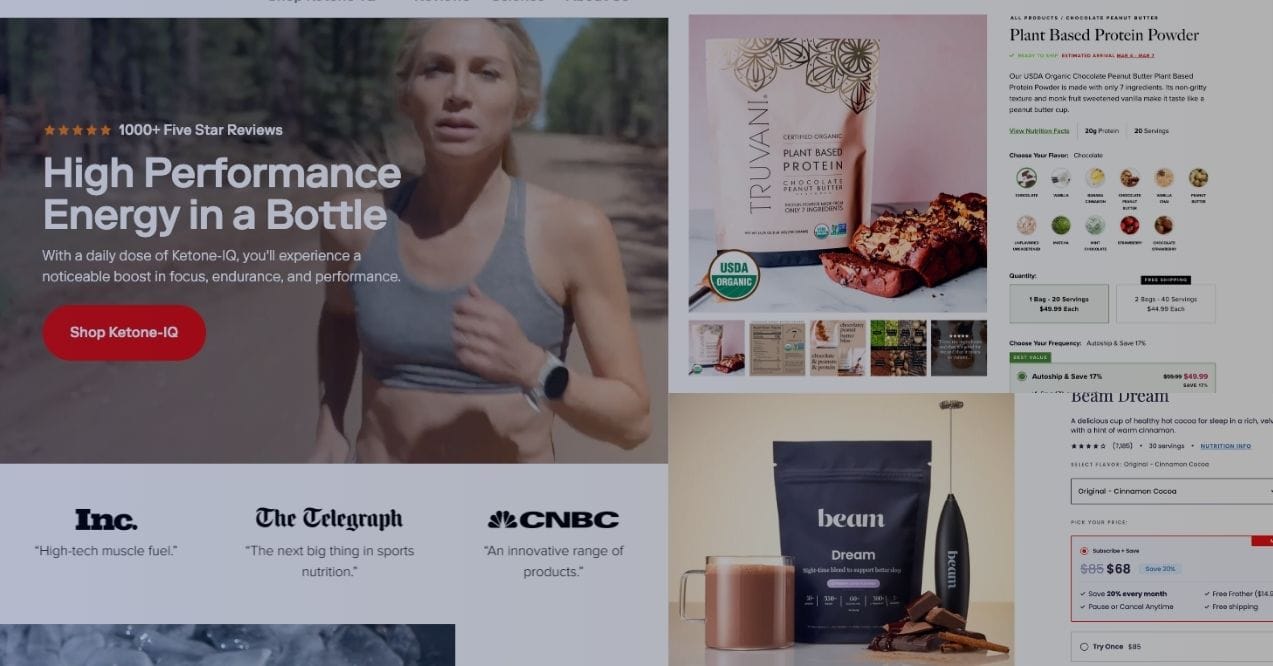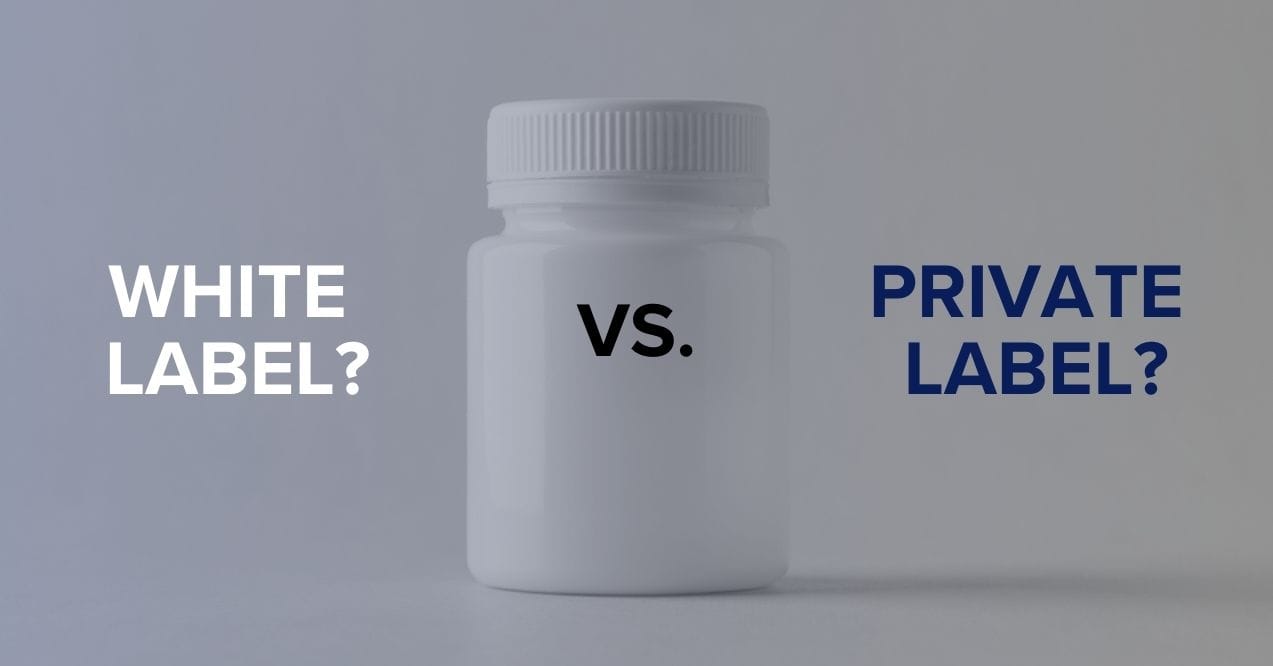How to Sell Supplements Successfully: The FDA Compliance Guide


Learning how to sell supplements successfully requires more than just choosing products and listing them online. This comprehensive guide will walk you through everything you need to know to build a thriving supplement business in 2026, from choosing your niche and navigating regulations to implementing effective marketing strategies and scaling your operations for long-term success.
The Current Supplement Industry Landscape
The supplement industry is experiencing unprecedented growth, making 2026 a strategic time to enter the market. Beyond the projected $30.5 billion valuation, consumer behavior is shifting toward proactive health and wellness, creating new opportunities for those learning how to sell supplements.
Market Growth and Trends
Recent studies show that 77% of U.S. adults are actively working to improve their health, with nearly 50% focusing on better nutrition. This trend extends globally, with Asia-Pacific leading supplement market growth due to rising health awareness and disposable incomes. South America is also experiencing increased supplement adoption, particularly among its expanding middle class.
For those exploring how to sell dietary supplements, staying ahead of emerging trends is crucial. Some key industry trends include:
- Consumers increasingly seek supplements tailored to their age, lifestyle, and specific health goals, including targeted multivitamins and DNA-based formulations.
- Transparency is a priority, with buyers preferring organic, non-GMO, and additive-free formulas over synthetic alternatives.
- Functional supplements for stress relief, gut health, and immune support remain among the fastest-growing categories.
- Many supplement brands are shifting to subscription-based models, offering convenience and ensuring long-term customer loyalty.
Popular Supplement Categories
From vitamins and minerals to sports nutrition and botanical extracts, the supplement market offers diverse products for various health concerns. Some of the best-selling supplement categories include:
- Multivitamins and single-nutrient supplements (e.g., Vitamin D, Omega-3, Zinc)
- Probiotics and digestive health products
- Plant-based and vegan-friendly supplements
- Workout and performance enhancers (e.g., protein powders, pre-workout formulas)
- Cognitive and mood-support supplements
The supplement industry presents massive opportunities for new sellers, but success requires understanding consumer trends, choosing the right products, and positioning your brand effectively. With a growing global demand, businesses that align with these industry shifts can create profitable and sustainable supplement brands.
Step 1: Choosing The Right Supplements to Sell
Deciding which dietary supplements to sell is a crucial step in building a successful business. With thousands of options available – from multivitamins to sports nutrition – choosing the right products requires research, strategy, and a clear understanding of market demand. Below are key factors to consider when selecting your supplement lineup.
Identifying Your Niche
The supplement market is highly competitive, and selling generic products can make it difficult to stand out. Finding a niche allows you to target a specific audience with tailored solutions. Some profitable niches include:
- Sports nutrition (e.g., protein powders, pre-workout formulas, muscle recovery supplements)
- Cognitive health (e.g., nootropics, adaptogens, brain-boosting supplements)
- Gut health (e.g., probiotics, digestive enzymes, fiber supplements)
- Beauty and skin health (e.g., collagen, biotin, antioxidant blends)
- General wellness (e.g., multivitamins, immune support, stress relief formulas)
Before selecting a niche, research industry trends using tools like Google Trends, Amazon Best Sellers, and competitor analysis. Look for growing demand and less saturated markets to increase your chances of success.
Sourcing and Manufacturing
Once you’ve identified your niche, the next step is deciding where and how to source your supplements. There are three main options:
- Private Labeling – Selling pre-made supplements under your own brand. This is the easiest way to launch, as manufacturers handle formulation and production.
- White Labeling – Similar to private labeling but with minimal customization, allowing for a faster time to market.
- Custom Formulation – Creating a unique supplement blend from scratch. This requires more investment but offers a competitive advantage.
When choosing a supplier, ensure they meet Good Manufacturing Practices (GMP) standards and offer third-party testing to maintain quality and compliance.
Pricing Strategy
Understanding profitability means setting a competitive price while maintaining healthy profit margins. Consider these pricing models:
- Cost-based pricing – Adding a fixed percentage markup on manufacturing costs.
- Value-based pricing – Charging based on perceived benefits and market demand.
- Bundle pricing – Offering supplement stacks for a better deal (e.g., protein + creatine + BCAAs).
- Subscription model – Encouraging repeat purchases through auto-ship programs.
To remain competitive, research competitor pricing on platforms like Amazon, Walmart, and direct-to-consumer (DTC) brands. Offering tiered pricing and loyalty discounts can help increase customer retention and drive long-term success.
Step 2: Legal and Compliance Considerations
Understanding legal and regulatory requirements is crucial when learning how to sell a supplement. The supplement industry is highly regulated, and non-compliance can lead to fines, product recalls, or bans from major platforms like Amazon or Walmart. Below are key legal considerations to help you navigate compliance and protect your business.
Regulations by Country
Different countries have different rules regarding supplements. If you plan to sell internationally, you’ll need to research specific regulations in your target markets. Here are some key regulatory bodies:
- United States – The FDA (Food and Drug Administration) regulates supplements under the Dietary Supplement Health and Education Act (DSHEA). While supplements don’t require FDA approval before sale, they must follow Good Manufacturing Practices (GMP) and cannot make misleading health claims.
- Europe – The EFSA (European Food Safety Authority) enforces strict guidelines on ingredient approval and labeling. Many supplement claims must be pre-approved and backed by scientific evidence.
- Canada – Supplements are classified as Natural Health Products (NHPs) and require a Natural Product Number (NPN) before being sold.
- Australia – The Therapeutic Goods Administration (TGA) strictly regulates supplements, often requiring pre-market approval.
Licensing and Compliance Requirements
If you’re selling pre-manufactured supplements, you typically don’t need a special license, as long as you source them from a licensed manufacturer that follows regulatory standards. However, businesses involved in private labeling, custom formulations, or making health-related claims may require additional certifications.
Retailers must also comply with:
- Age restrictions for certain ingredients.
- Accurate ingredient transparency in product descriptions.
- Consumer safety warnings, especially for supplements that may interact with medications.
Medical Claims
One of the most challenging aspects when selling supplements is marketing compliance. In the U.S., the FDA and FTC (Federal Trade Commission) regulate what can be said about a product’s benefits.
Supplements CANNOT:
- Claim to “cure,” “treat,” or “prevent” a disease or medical condition.
- Use misleading phrases like “miracle formula” or “guaranteed results.”
- Make bold health promises without scientific backing.
Instead, brands must use structure-function claims, which describe how a supplement supports normal body functions without making medical claims.
- “Supports immune health” instead of “Prevents colds”
- “Promotes digestive balance” instead of “Cures bloating”
- “Helps maintain healthy cholesterol levels” instead of “Lowers cholesterol”
Staying compliant not only protects your business from legal risks but also helps build consumer trust and credibility in the competitive supplement industry.
Step 3: Choosing The Right Sales Channels
Knowing how to sell supplements online is another crucial step in building a successful supplement business. Here are the most effective platforms for selling supplements online and help you make an informed decision for your business.
Your Own E-Commerce Website
Operating your own website provides complete autonomy over your supplement business operations. This approach offers supplement brands the opportunity to build a distinctive brand presence while maintaining full control over their operations and customer relationships.
Essential elements of a successful supplement website:
- Professional design that builds trust and credibility with potential customers
- Detailed product pages with clear benefits, ingredients, and usage instructions
- Secure payment processing and SSL certification
- Mobile-responsive design for seamless shopping across devices
- Subscription options for customer convenience and recurring revenue
Advantages:
- Complete brand control over messaging, design, and customer experience
- Higher profit margins without marketplace commissions
- Direct customer relationships and data ownership
- Marketing flexibility for various promotional strategies
- Custom features like subscription services for supplements
Challenges:
- Initial setup costs for professional website development
- Ongoing maintenance and technical support requirements
- Responsibility for driving traffic through marketing
- Extra effort needed to establish credibility as an independent seller
Marketplace Platforms
If you’re still wondering where to sell supplement, online marketplaces like Amazon, eBay, and Walmart provide instant access to millions of potential buyers. These platforms attract high-intent shoppers searching for health and wellness products, making them an appealing choice for supplement brands.
Advantages:
- Built-in customer traffic with high-intent shoppers
- Established trust and credibility with consumers
- Access to fulfillment services (like Amazon FBA)
Challenges:
- Strict advertising and compliance policies
- Competitive pricing pressures affecting margins
- Limited control over brand presentation
- Platform-specific rules and algorithms
Social Media
Social media provides direct-to-consumer engagement and allows for both organic and paid sales strategies. These platforms enable brands to showcase their products through engaging visuals, influencer collaborations, and real-time interactions with customers.
Advantages:
- Massive audience engaged with health content
- Opportunity for influencer partnerships
- Direct customer interaction capabilities
- Visual showcase of products
Challenges:
- Strict advertising policies for health products
- Fluctuating organic reach
- High competition in the supplement space
- Need for constant content adaptation
How to Choose The Right Sales Channel
Selecting the optimal sales channels for your supplement business is a crucial decision that impacts your success in the online marketplace. A strategic approach to channel selection helps ensure sustainable growth and strong market presence when learning how to sell supplements online.
Understanding online sales channel dynamics:
- Direct-to-consumer websites provide complete brand control and higher margins but require significant investment in marketing and website development to sell supplements effectively.
- Marketplaces like Amazon offer built-in traffic and fulfillment solutions for selling supplements online but come with platform fees and intense competition.
- Social media platforms enable direct engagement with health-conscious audiences looking to buy supplements online but may require more effort in building trust and converting sales.
Key selection criteria for selling supplements online:
- Market presence and audience alignment – Choose platforms where your target customers naturally shop for supplements and wellness products online.
- Operational requirements – Assess your capability to handle order fulfillment, customer service, and inventory management across different online supplement sales channels.
- Cost structure and profitability – Calculate platform fees, advertising costs, and fulfillment expenses to ensure sustainable profit margins when selling supplements online.
- Brand control and presentation – Evaluate how well each channel allows you to maintain your desired brand image and product positioning in the online supplement market.
- Competition landscape – Research competitor presence and performance across different platforms to identify opportunities to sell supplements online effectively.
Remember that successful supplement businesses often employ multiple complementary sales channels, creating an integrated approach that maximizes market reach while maintaining operational efficiency. Regular evaluation and adjustment of your channel strategy ensures continued alignment with business goals and market conditions.
Step 4: Building a Marketing Strategy
Marketing is one of the most critical aspects of selling supplements successfully. With a highly competitive market, standing out requires a clear brand identity, an effective online presence, and smart advertising strategies. Below, we’ll break down key marketing techniques to help you reach the right audience and drive sales.
Building a Strong Brand Foundation
Your brand identity goes beyond visual elements to encompass your company’s values, mission, and unique market position. When developing your supplement brand, focus on:
- Create a compelling unique selling proposition (USP) that clearly communicates what makes your supplements different, whether it’s organic ingredients, scientific validation, or targeting specific demographics like athletes or seniors.
- Develop professional branding elements including high-quality packaging, memorable brand name, and consistent visual identity across all marketing channels.
- Establish trust through third-party certifications (GMP, NSF), transparent ingredient sourcing, and authentic customer testimonials that validate product quality and effectiveness.
Digital Marketing and Online Presence
With the supplement industry’s significant online presence, a strong digital marketing strategy is essential:
- Implement comprehensive SEO to improve organic visibility, focusing on relevant keywords and creating valuable content that addresses customer questions about supplements and nutrition.
- Launch targeted paid advertising campaigns through Google Search and Shopping, optimizing ad copy to highlight product benefits and competitive advantages.
- Use retargeting strategies to re-engage website visitors who showed interest but haven’t made a purchase, helping to convert browsing into sales.
Social Media and Content Marketing
Engaging content builds authority and drives customer engagement in the supplement space:
- Leverage platforms like Instagram, Facebook, and TikTok to showcase products, share educational content, and build community around your brand.
- Partner with relevant influencers, particularly micro-influencers (10k-50k followers) who often deliver higher engagement rates than celebrity endorsements.
- Create diverse content including blog posts, videos, and social media content that educates customers about supplement benefits, usage, and general wellness topics.
Customer Retention and Loyalty Programs
Research indicates that returning customers spend 67% more than new customers on supplements:
- Implement email marketing campaigns with personalized product recommendations and educational content to maintain engagement.
- Develop loyalty programs offering points, exclusive discounts, and early access to new products.
- Create referral programs that incentivize existing customers to share their positive experiences, as word-of-mouth remains one of the most trusted sources for supplement recommendations.
This strategic approach to marketing helps establish credibility, drive customer acquisition, and build lasting relationships in the supplement industry. Success requires consistent execution across all channels while maintaining focus on providing value and building trust with your target audience.
Step 5: Operational Considerations
Running a successful supplement business requires robust operational infrastructure that extends beyond marketing and sales. Proper inventory management, fulfillment efficiency, and customer service excellence form the foundation for sustainable growth in the competitive supplement market.
Supply Chain and Inventory Management
Effective supply chain management directly impacts profitability and customer satisfaction:
- Implement inventory management systems that provide real-time stock tracking and automated reordering to prevent stockouts and overstock situations.
- Partner with GMP-certified manufacturers and FDA-compliant suppliers to ensure consistent product quality and regulatory compliance.
- Choose appropriate fulfillment methods based on business scale, with options including in-house warehousing, dropshipping, or third-party logistics (3PL).
- Establish quality control protocols including regular batch testing, certification verification, and supplier audits to maintain product integrity.
Fulfillment and Logistics
Efficient order processing and delivery are essential for customer satisfaction:
- Select shipping partners that offer reliable service and competitive rates while maintaining product quality during transit.
- Implement order management systems that integrate with multiple sales channels for streamlined processing.
- Consider temperature-controlled storage and shipping for heat-sensitive supplements to maintain product efficacy.
- Monitor shipping metrics and customer feedback to optimize delivery performance and reduce costs.
Customer Service Excellence
Outstanding customer support builds trust and encourages repeat purchases in the supplement industry:
- Develop comprehensive product information resources including detailed descriptions, dosage guidelines, and ingredient explanations.
- Offer multiple support channels including email, phone, and live chat with trained representatives who understand supplement-specific concerns.
- Create clear policies for returns, refunds, and subscription management that align with industry standards and marketplace requirements.
- Implement automated systems for common customer service tasks while maintaining personal support for complex issues.
Step 6: Growth and Scaling Strategies
Once a supplement business gains traction, the next step is scaling for long-term growth. A well-planned expansion strategy ensures steady revenue, brand recognition, and market reach. If you’re exploring how to sell supplements beyond your initial market, consider these key approaches:
- Introducing new supplement formulations, bundle offers, or complementary products can attract repeat customers and boost average order value.
- Expanding into new demographics, international markets, or specialized niches (e.g., vegan supplements, sports nutrition) increases sales potential.
- Selling across multiple sales channels (e.g., eCommerce, marketplaces, retail partnerships) reduces dependency on a single revenue stream.
- Strengthening brand identity through content marketing, influencer collaborations, and community engagement fosters trust and long-term customer loyalty.
A strategic approach to expansion helps businesses scale efficiently while maintaining product quality and customer trust.
Final Thoughts
Understanding how to sell supplements successfully requires a combination of strategic product selection, regulatory compliance, strong sales channels, and efficient operations. As the supplement industry continues to grow, businesses that focus on quality, transparency, and customer trust will stand out in a competitive market. Whether you’re launching a new brand or scaling an existing one, the right approach can drive long-term success.
Now is the perfect time to enter this thriving industry. Start by researching your niche, optimizing your sales strategy, and building a strong brand. Ready to take the next step? Begin your journey today!
References
Statista. (2022). Market size of vitamin and mineral supplements in North America 2019-2025, by country. https://www.statista.com/statistics/1283292/market-size-of-vitamins-and-mineral-supplements-north-america-by-country/
Rising, S. (n.d.). Health & Wellness Trend Report 2020 | Stella Rising. https://www.stellarising.com/health-and-wellness-trend-report-2020
Charted: Here’s how Americans are approaching healthy eating. (2023). World Economic Forum. https://www.weforum.org/stories/2023/03/health-food-us/
Research, N. D. C. M. (2023). South America Dietary Supplements Market Report 2025, Market Size, Share, growth, CAGR, Forecast, revenue. Cognitive Market Research. https://www.cognitivemarketresearch.com/regional-analysis/south-america-dietary-supplements-market-report
Dove, M., Balasubramanian, A., & Narayanan, B. G. (2020). Transparency as a way of attaining quality, safety and optimal food purchases. SocioEconomic Challenges, 4(4), 48–62. https://www.researchgate.net/publication/348393497_Transparency_As_A_Way_Of_Attaining_Quality_Safety_And_Optimal_Food_Purchases
Global Dietary Supplements Market Size, Trends, Share 2033. (2025). Custom Market Insights. https://www.custommarketinsights.com/report/dietary-supplements-market/
Program, H. F. (2024). Questions and answers on dietary supplements. U.S. Food And Drug Administration. https://www.fda.gov/food/information-consumers-using-dietary-supplements/questions-and-answers-dietary-supplements
Gerlich, M. (2023). TThe Power of Personal Connections in Micro-Influencer Marketing: A Study on Consumer Behaviour and the Impact of Micro-Influencers. ResearchGate. https://www.researchgate.net/publication/370939732_The_Power_of_Personal_Connections_in_Micro-Influencer_Marketing_A_Study_on_Consumer_Behaviour_and_the_Impact_of_Micro-Influencers
Dublino, J. (2024). Returning customers spend 67 percent more than new customers – Keep your customers coming back with a recurring revenue sales model. business.com. https://www.business.com/articles/returning-customers-spend-67-more-than-new-customers-keep-your-customers-coming-back-with-a-recurring-revenue-sales-model/
The supplement market is seeing increased demand for personalized nutrition, plant-based formulations, nootropics for cognitive health, and adaptogenic herbs. Clean label products, sustainable packaging, and subscription-based delivery models are also gaining popularity.
The supplement market is highly competitive, particularly in common categories like vitamins and protein powders. However, opportunities exist in emerging niches like personalized supplements, condition-specific formulations, and innovative delivery formats.
The supplement industry is moving toward personalization, scientific validation, and technological integration. Key developments include AI-driven formulations, enhanced bioavailability through advanced delivery systems, and increased focus on sustainability and transparency in manufacturing.
COMMONLY ASKED QUESTIONS
Advertisement. This site offers health, wellness, fitness and nutritional information and is designed for educational purposes only. You should not rely on this information as a substitute for, nor does it replace, professional medical advice, diagnosis, or treatment. If you have any concerns or questions about your health, you should always consult with a physician or other health-care professional. Do not disregard, avoid or delay obtaining medical or health related advice from your health-care professional because of something you may have read on this site. The use of any information provided on this site is solely at your own risk.

















